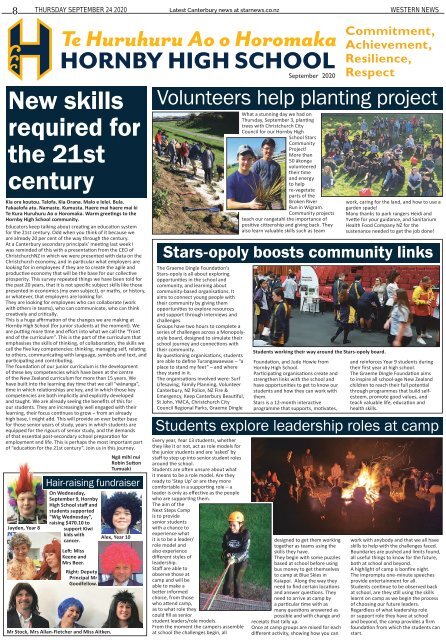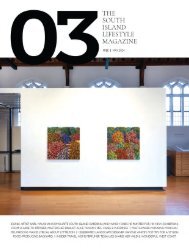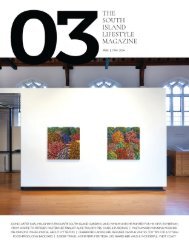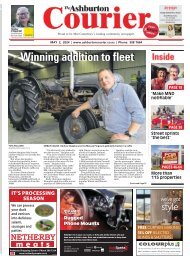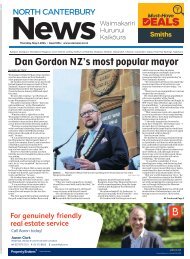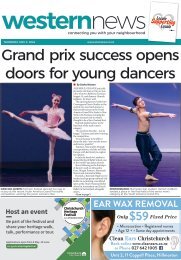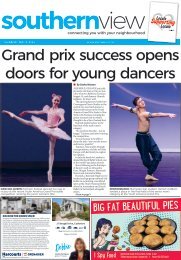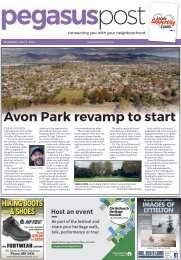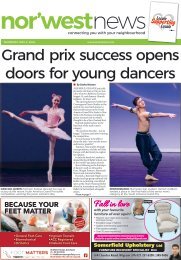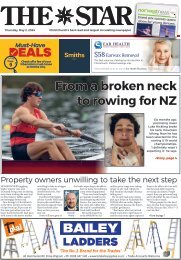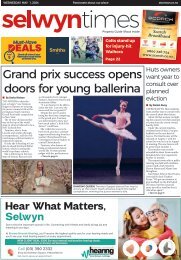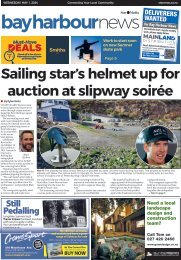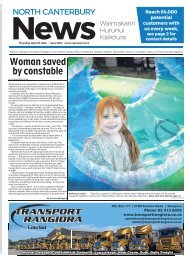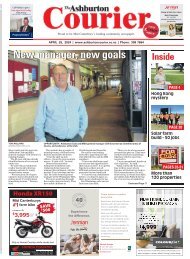Western News: September 24, 2020
Create successful ePaper yourself
Turn your PDF publications into a flip-book with our unique Google optimized e-Paper software.
8 Thursday <strong>September</strong> <strong>24</strong> <strong>2020</strong><br />
Latest Canterbury news at starnews.co.nz<br />
WESTERN NEWS<br />
<strong>September</strong> <strong>2020</strong><br />
Commitment,<br />
Achievement,<br />
Resilience,<br />
Respect<br />
New skills<br />
required for<br />
the 21st<br />
century<br />
Kia ora koutou. Talofa. Kia Orana. Malo e lelei. Bula.<br />
Fakaalofa atu. Namaste. Kumusta. Haere mai haere mai ki<br />
Te Kura Huruhuru Ao o Horomaka. Warm greetings to the<br />
Hornby High School community.<br />
Educators keep talking about creating an education system<br />
for the 21st century. Odd when you think of it because we<br />
are already 20 per cent of the way through the century.<br />
At a Canterbury secondary principals’ meeting last week I<br />
was reminded of this with a presentation from the CEO of<br />
ChristchurchNZ in which we were presented with data on the<br />
Christchurch economy, and in particular what employers are<br />
looking for in employees if they are to create the agile and<br />
productive economy that will be the base for our collective<br />
prosperity. This survey repeated things we have been told for<br />
the past 20 years, that it is not specific subject skills like those<br />
presented in economics (my own subject), or maths, or history,<br />
or whatever, that employers are looking for.<br />
They are looking for employees who can collaborate (work<br />
with others in teams), who can communicate, who can think<br />
creatively and critically.<br />
This is a huge affirmation of the changes we are making at<br />
Hornby High School (for junior students at the moment). We<br />
are putting more time and effort into what we call the “front<br />
end of the curriculum”. This is the part of the curriculum that<br />
emphasises the skills of thinking, of collaboration, the skills we<br />
call the five key competencies: thinking, managing self, relating<br />
to others, communicating with language, symbols and text, and<br />
participating and contributing.<br />
The foundation of our junior curriculum is the development<br />
of these key competencies which have been at the centre<br />
of the New Zealand curriculum for more than 15 years. We<br />
have built into the learning day time that we call “wānanga”,<br />
time in which relationships are key, and in which those key<br />
competencies are both implicitly and explicitly developed<br />
and taught. We are already seeing the benefits of this for<br />
our students. They are increasingly well engaged with their<br />
learning, their focus continues to grow – from an already<br />
high base, I might add. This will provide an ever better base<br />
for those senior years of study, years in which students are<br />
equipped for the rigours of senior study, and the demands<br />
of that essential post-secondary school preparation for<br />
employment and life. This is perhaps the most important part<br />
of “education for the 21st century”. Join us in this journey.<br />
Jayden, Year 8<br />
Ngā mihi nui<br />
Robin Sutton<br />
Tumuaki<br />
Hair-raising fundraiser<br />
On Wednesday,<br />
<strong>September</strong> 9, Hornby<br />
High School staff and<br />
students supported<br />
“Wig Wednesday”,<br />
raising $470.10 to<br />
support Kiwi<br />
kids with<br />
cancer.<br />
Left: Miss<br />
Keene and<br />
Mrs Beer.<br />
Right: Deputy<br />
Principal Mr<br />
Goodfellow.<br />
Mr Stock, Mrs Allan-Fletcher and Miss Aitken.<br />
Alex, Year 10<br />
Volunteers help planting project<br />
The Graeme Dingle Foundation’s<br />
Stars-opoly is all about exploring<br />
opportunities in the school and<br />
community, and learning about<br />
community-based organisations. It<br />
aims to connect young people with<br />
their community by giving them<br />
opportunities to explore resources<br />
and support through interviews and<br />
challenges.<br />
Groups have two hours to complete a<br />
series of challenges across a Monopolystyle<br />
board, designed to simulate their<br />
school journey and connections with<br />
their community.<br />
By questioning organisations, students<br />
are able to define Turangawaewae – “a<br />
place to stand my feet” – and where<br />
they stand in it.<br />
The organisations involved were: Surf<br />
Lifesaving, Family Planning, Volunteer<br />
Canterbury, NZ Police, NZ Fire &<br />
Emergency, Keep Canterbury Beautiful,<br />
St John, YMCA, Christchurch City<br />
Council Regional Parks, Graeme Dingle<br />
What a stunning day we had on<br />
Thursday, <strong>September</strong> 3, planting<br />
trees with Christchurch City<br />
Council for our Hornby High<br />
School Stars<br />
Community<br />
Project!<br />
More than<br />
50 ākonga<br />
volunteered<br />
their time<br />
and energy<br />
to help<br />
re-vegetate<br />
parts of the<br />
Broken River<br />
Run in Wigram.<br />
Community projects<br />
teach our rangatahi the importance of<br />
positive citizenship and giving back. They<br />
also learn valuable skills such as team<br />
Foundation, and Jude Howie from<br />
Hornby High School.<br />
Participating organisations create and<br />
strengthen links with the school and<br />
have opportunities to get to know our<br />
students and how they can work with<br />
them.<br />
Stars is a 12-month interactive<br />
programme that supports, motivates,<br />
work, caring for the land, and how to use a<br />
garden spade!<br />
Many thanks to park rangers Heidi and<br />
Yvette for your guidance, and Sanitarium<br />
Health Food Company NZ for the<br />
sustenance needed to get the job done!<br />
Stars-opoly boosts community links<br />
and reinforces Year 9 students during<br />
their first year at high school.<br />
The Graeme Dingle Foundation aims<br />
to inspire all school-age New Zealand<br />
children to reach their full potential<br />
through programmes that build selfesteem,<br />
promote good values, and<br />
teach valuable life, education and<br />
health skills.<br />
Students explore leadership roles at camp<br />
Every year, Year 13 students, whether<br />
they like it or not, act as role models for<br />
the junior students and are ‘asked’ by<br />
staff to step up into senior student roles<br />
around the school.<br />
Students are often unsure about what<br />
it means to be a role model. Are they<br />
ready to ‘Step Up’ or are they more<br />
comfortable in a supporting role – a<br />
leader is only as effective as the people<br />
who are supporting them.<br />
The aim of the<br />
Next Steps Camp<br />
is to provide<br />
senior students<br />
with a chance to<br />
experience what<br />
it is to be a leader/<br />
role model and<br />
also experience<br />
different styles of<br />
leadership.<br />
Staff are able to<br />
observe those at<br />
camp and will be<br />
able to make a<br />
better informed<br />
choice, from those<br />
who attend camp,<br />
as to what role they<br />
could fill as senior<br />
student leaders/role models.<br />
From the moment the campers assemble<br />
at school the challenges begin, all<br />
Students working their way around the Stars-opoly board.<br />
designed to get them working<br />
together as teams using the<br />
skills they have.<br />
They begin with some puzzles<br />
based at school before using<br />
bus money to get themselves<br />
to camp at Blue Skies in<br />
Kaiapoi. Along the way they<br />
need to find certain locations<br />
and answer questions. They<br />
need to arrive at camp by<br />
a particular time with as<br />
many questions answered as<br />
possible and with change and<br />
receipts that tally up.<br />
Once at camp groups are mixed for each<br />
different activity, showing how you can<br />
work with anybody and that we all have<br />
skills to help with the challenges faced.<br />
Boundaries are pushed and limits found,<br />
all useful things to know for the future,<br />
both at school and beyond.<br />
A highlight of camp is bonfire night.<br />
The impromptu one-minute speeches<br />
provide entertainment for all.<br />
Students continue to be observed back<br />
at school, are they still using the skills<br />
learnt on camp as we begin the process<br />
of choosing our future leaders.<br />
Regardless of what leadership role<br />
or support role they have at school<br />
and beyond, the camp provides a firm<br />
foundation from which the students can<br />
start.


